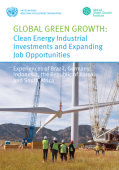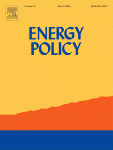This paper explores innovation in wind energy in Denmark and Germany. It examines the key features and similarities of, and differences in each country’s technological and organizational innovation paths and sheds light on their main determinants. It finds that common features have roots in similar social and political priorities and decisions at the national level. The differences, on the other hand, tend to have roots in geographical conditions and company-level technology choices.
In the end, the paper briefly addresses the increasing global interconnectedness of wind technology markets and the role of emerging new players, such as China and India.

This report examines the specific industrial policy measures promoting a low-carbon transition in five focus countries, specifically Brazil, Germany, Indonesia, the Republic of Korea and South Africa, through a compilation of expert review studies. It shows that across all levels of development, major attention is being paid to the threats of climate change and opportunities of pursuing a low-carbon development path, and dedicated efforts are presented to operate efficient industrial policies to enhance green growth. However, it is clear that the major focus in developing countries will need to be on green investments and on creating an enabling environment for such investments if the global economy is to effectively combat climate change.
This report is the second volume in a two volume set. Volume I of the report, providing overall findings from the project, can be accessed here.
This study, undertaken by Eunomia Research & Consulting (Eunomia) in conjunction with Professor Mikael Skou Andersen of Aarhus University and the Institute for European Environmental Policy (IEEP), has, as its central aim, to: “… provide empirical data or secondary sources on the potential economic and social benefits of environmental fiscal reform, to support the input in the European Semester process on environmental protection and resource efficiency”. The specification elaborates on this as follows: “The task includes presenting data on the potential of revenues from environmental taxation and other indirect benefits such as job creation resulting from EFR in 14 selected countries, using the methodology the EEA has developed and which was also applied to the study published on 03.03.14 for 12 Member States”. The following 14 Member States were included in this study: Bulgaria, Cyprus, Denmark, Finland, Germany, Greece, Latvia, Malta, Netherlands, Slovenia, Spain, Sweden, Ireland, United Kingdom.
This report examines how budgets can be greening by pricing carbon and cutting environmental harmful subsidies. The publication provides lessons on how greening the budget combines fiscal responsibility with the environmental sensibility that is inevitable for a sustainable future.

This paper addresses the challenge of Germany׳s energy transition (Energiewende) as the centrepiece of the country׳s green industrial policy. In addition to contributing to global climate change objectives, the Energiewende is intended to create a leading position for German industry in renewable energy technologies, boost innovative capabilities and create employment opportunities in future growth markets at the least possible cost. The success in reaching these aims, and indeed the future of the entire concept, is hotly debated.
